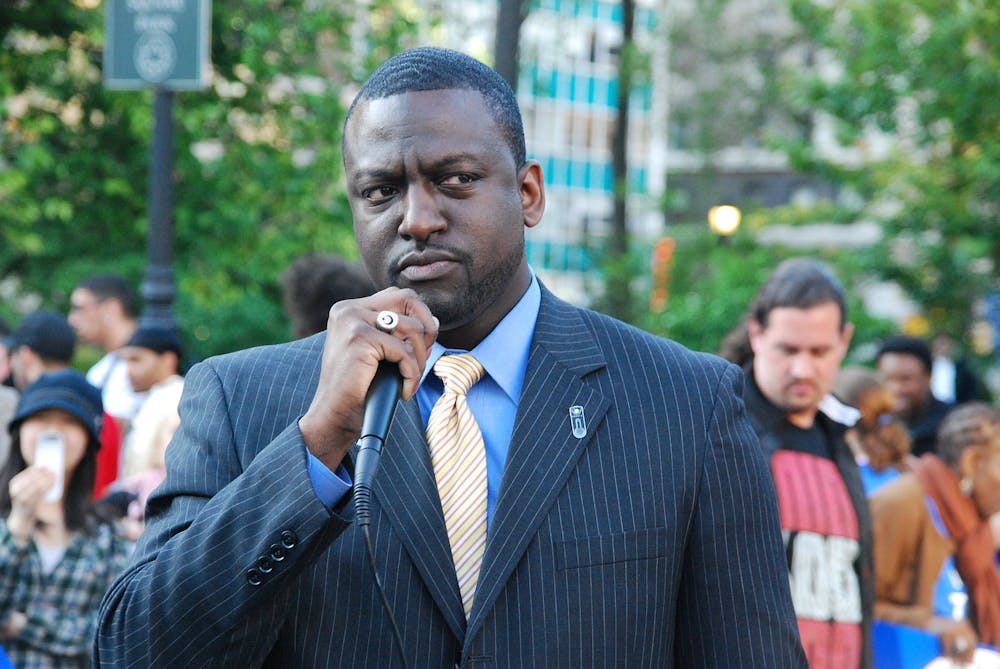The Milton S. Eisenhower (MSE) Symposium hosted Yusef Salaam during its third speaker event in the “Living Through History” series on Oct. 20.
Salaam is a member of the Central Park Five, a group of four Black teenagers and one Latino teenager who were falsely accused and convicted of raping a woman in Central Park in 1989. The five men were exonerated in 2002 in light of DNA evidence and a confession from the true perpetrator.
Salaam spoke about the harsh treatment he faced from both the public and the criminal justice system through the duration of this case.
“We weren’t afforded the opportunity to be seen as innocent because of the color of their skin,” he said. “I became known as a rapist at the age of 15. It was not something I chose for myself, rather something being described and defined about me for the rest of the world.”
The accused boys received hate mail and death threats were doxxed in New York newspapers and were called “urban terrorists.” Salaam showed the audience a copy of one of U.S. President Donald Trump’s full-page ads from 1989, which he purchased in four New York City newspapers, calling for the death penalty to be given to the Central Park Five.
Salaam presented several other visuals, such as the pair of pants that he wore on the evening that he was arrested. The pair of pants has not been washed since that day.
Senior and Marketing Chair of the MSE Symposium Cindy Cho noted that the use of these props might not have happened in person.
“We maybe would’ve seen them through a slide,” she said. “I was initially skeptical and afraid that the experience would be too impersonal, but each event proves how it can be just as, if not more, intimate than an in-person one.”
Salaam also recited from memory the spoken word poem that he performed in the courtroom before his sentencing.
In an email to The News-Letter, sophomore Kylie Ning noted that she found this moment to be extremely powerful.
“I got chills when he read the exact same speech he gave in the courthouse right before he got sentenced,” she wrote.
Cho was moved by the fact that Salaam recounts his past so vividly.
“You can obviously tell that what happened to him is still a huge part of his identity. I was surprised that it was still so ingrained in him,” she said. “I expected him to shy away from that because he is known for other things and has since become such a voice for prison reform and racism, but he embraced it and wanted to shed light on his case because it is still so relevant today.”
The 2019 Netflix miniseries When They See Us offers a true account of the trial and lives of the Central Park Five. Salaam confirmed that the miniseries is completely true, even despite some creative liberties that were taken. For instance, Salaam was arrested in his home, not on the streets of New York, but the creators chose to portray it as such because that was a common occurrence for youths in Salaam’s neighborhood.
Sophomore Andrea Guillen felt that Salaam’s comments on the miniseries illustrated the realities of his life and the lives of those like him.
“His story was not just an anomaly in American history; it’s something that happens all the time,” she said. “It’s a spectacular story but closer to normal than we’d like to believe.”
Salaam spoke about his experiences in the criminal justice system and the subsequent work he has done to advocate against it. He highlighted that though the 13th Amendment outlaws slavery by name, modified forms of it are continually present in the U.S. today through the prison system.
He explained that this reality directly contradicts the idea that the criminal justice system is broken, as those who advocate for prison and police reform say.
“To use the word ‘slavery’ is to allow slavery to exist by another name,” he said. “The system is not broken. It’s working exactly as it’s designed.”
Regarding the recent influx of protests for racial justice and criminal justice reform, Salaam shared his thoughts about the direction in which he thinks the movement should go.
“This is not a band-aid kind of moment. In abolition we need to understand that we’re not bulldozing a whole system overnight,” he said. “We’re talking about a marathon, intergenerational planning — the farsightedness to keep moving forward progressively in a way that allows for the human family to move into their future with the same dream that Dr. King spoke about.”
Salaam also voiced concerns over Trump’s presidency and his lack of regard for the gravity of the COVID-19 pandemic.
“Why doesn’t the person on top really do good for the people?” he said. “We have to climb out of the hole we are in.”
Guillen enjoyed the event and felt that it offered unique insight into the life of someone whose life has changed in the public eye. She appreciated that Salaam focused his presentation not only on the Central Park Five case but also on his struggles and actions since his exoneration.
“When these things happen on the news, it doesn’t feel human. We don’t feel it up close and personally. Having this opportunity to hear him talk and see people I know ask questions put a lot of reality into it,” she said. “Not everyone is able to figure everything out from a documentary. This could only have been achieved through this symposium.”





